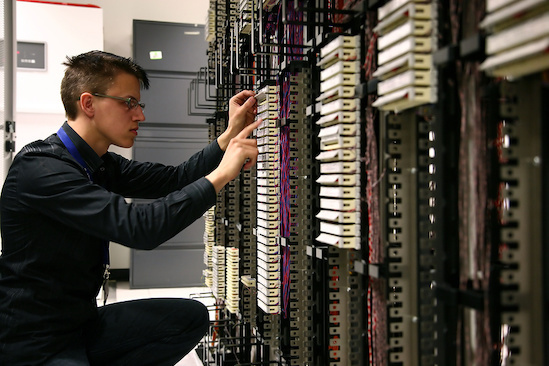If you're a Trekkie, one of your favorite television inventions that hasn't made its way to your neighborhood Bones yet is the scanner that immediately diagnoses your medical condition followed by -- even better -- the painless shot that cures it. I don't know anyone who doesn't want advances in medical technology. But to get those advances, what might you have to give up? A certain level of privacy, for one thing.
If you knew that by always wearing a sensor you were contributing to your own health and safety and possibly contributing to that of others, would you wear it? You just might if you knew that that sensor was, say, monitoring your blood sugar levels and your kidneys and able to send you alerts about your increased risk for diabetes, and then automatically sent helpful information like nutritious menus. But what if that same alert also caused your health insurance provider to classify you as a greater risk? Now you have to think twice. And now, you've entered the world of Big Data.

Photo courtesy of New Jersey Institute of Technology (NJIT)
If you're like most people, Big Data may not mean much to you yet. It might even conjure up images of an oversized computer in some backroom and just make your eyes glaze over. Like the cloud or cybersecurity or bioprinting, it's just one more thing you don't have to know about -- until you do.
Big Data and the calls for regulation, increased privacy, "big data literacy," and transparency that surround it are all issues that need our focus now.
Odds are, Big Data already has affected your life in very personal ways. So personal in fact that the Federal Trade Commission has called upon Congress, several times now, to regulate Big Data brokers so that you might at least have some say in how they use information that you provide daily. Those calls are whispers in an age where Google, Amazon and Facebook dominate our attention and are known for ushering in a new level of corporate responsibility.
What will be the new applications for the Apple Watch, Fitbit or the latest gadget you love most? How many apps have you given access to your life, via your mobile phone, just for the convenience of using them?
Have you taken advantage of that free magazine subscription offered after you made an online purchase? Your magazine choice may have just gotten you profiled as say a "bike enthusiast," which might not be a bad thing if you don't mind ads for Kawasaki following you around the Internet. Hey, you might even be ready to buy a Kawasaki and Big Data has made your life easier. Except when your insurance company finds out and labels you as "high risk" and your premiums go up -- even before you buy the bike.
Big Data, or the collection, analysis and use of large amounts of information to optimize performance, may forever be a double-edged sword. It's great if it helps the Germans win the World Cup, as it did in 2014. It's not so great if your kid always dreamed of playing for the German national team but can't even get a try out because his "data" isn't quite what the Germans want right now. And what happens when the sophisticated sensors and cameras that the Germans could afford for their entire team are now cheap enough for your local high school or township soccer club to buy?
Big Data is great when it is used to make life easier and it's horrible when it is used to deny or take things away. That's why it's a topic that needs to be on your mind now before the not-too-distant future is here and you're making that decision about whether to wear the latest sensor.
It's a topic that is on the mind of educators, particularly those of us who focus on STEM fields, because we need to properly train a whole new wave of analysts, behaviorists and even lawyers and economists so that Big Data can be used to enhance life and not impede it. It's also on our minds because we have faculty and student researchers who are working to improve the mechanics behind Big Data and to solve the challenges of using massive funds of information efficiently and effectively.
Big Data allows scientists to do things like take collective information about people who have diabetes to improve disease prevention. It can also allow researchers to look at outlying data -- like the people who should have gotten diabetes but didn't -- to find cures. But what happens when it is used to determine that once there is a cure, so few people will get the disease that now a prevention pill that once cost $13 should now cost $750 or $7,500?
Whether it's marketing or service delivery or forecasting, Big Data and how it is used is affecting every business today and will affect every person tomorrow. Conferences are being held on how employers can use Big Data to identify good employees and shut out others based on their browsing histories. If you've ever heard of someone falsifying a resume, I'm sure you can imagine that data manipulation to provide an attractive Big Data profile won't be far behind.
Everyday technology and science bring us one-step closer to that pain-free medical cure that we love from Star Trek. And every day we must think more about our own roles and responsibilities related to the big issues that are upon us. Big Data is real and it is looming large.